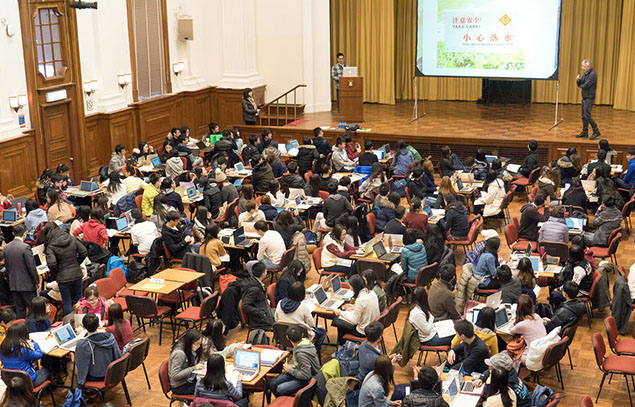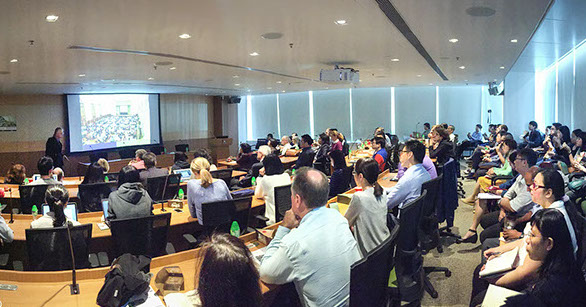
FLIPPING THE CLASSROOM
Lectures are typically sit-and-listen sessions. But in Professor Rick Glofcheski’s tort law classes, students do all the talking.

Professor Rick Glofcheski of the Department of Law is recognised as a very good lecturer. He has been honoured with teaching awards by HKU and the University Grants Council and consistently scores highly in student evaluations. But for all that, he has still found himself wondering – just how much do students learn in his lectures?
“Students say they love my lectures, but that doesn’t mean they are learning anything. Research shows that after listening to something like a lecture, you only retain three or four per cent of what you heard. What does anyone really remember from the lectures in their undergraduate years? What they probably do recall is what they learned from an assignment or project that they did,” he said.
He decided to inject that understanding into his teaching and at the beginning of this academic year, redesigned the way he teaches his second-year tort law class.
Rather than sitting in a lecture theatre taking notes, students are expected to do a lot of that work beforehand. They watch online lectures recorded by Professor Glofcheski that are about half an hour long and cover the legal points that will be the focus of the class; they do readings (as they would do with regular lectures); and they do preparatory work such as finding and analysing a real-life example that illustrates the point of law under discussion. So even before they come to class, they will already be thinking deeply about the topic.
For example, a recent session covered occupier’s liability. The pre-class assignment was to take a photo of a sign related to that area of law and analyse it. “This was not just for fun – these cases go to court all the time. People fall and get hurt and the occupier, who could be a bank, a shopping mall, a university, will say they had a sign warning of the danger. Well, where was the sign? Was the warning understood? Was it posted in Chinese and English? There are a whole bunch of legal requirements to be counted before you can say the occupier satisfied their obligations.”

![]() What does anyone really remember from the lectures in their undergraduate years? What they probably do recall is what they learned from an assignment or project that they did.
What does anyone really remember from the lectures in their undergraduate years? What they probably do recall is what they learned from an assignment or project that they did. ![]()
Professor Rick Glofcheski
Real-world problems
On the day of the class, students are assigned to groups of five or six and told where to sit at Loke Yew Hall (chosen because it can accommodate the class of more than 260 students sitting around tables in groups). They share and discuss their photographs in their group, then the entire class is presented with a case drawn from a short newspaper report that reflects the legal area being
studied – in the occupier’s liability case, a story about an elevator repairman who died on the job. The students have to brainstorm and write up their legal analysis of the case, while Professor Glofcheski and tutors walk answering questions and providing guidance.
“This is called flipped learning. It’s not really new, it’s just new in higher education,” he said. “When you were in primary school, you didn’t take notes, you did activities. Here, students are coming to class and applying what they learned in problem-solving.”
Student feedback has been very positive. Professor Golfeheski surveyed his students several times – at the end of last year and beginning of this year to gauge interest, and after the first flipped class in October – and in each case got overwhelming support for this approach.
Two videos about the session have been uploaded to HKU’s teaching and learning pages and include student comments that reinforce the survey response. One student said: “You learn to juggle different opinions– very stimulating and unsought opinions – on the spot. And you also have to express your opinions in the best way possible.” Another noted: “It was a very good way to apply what we have learned to real cases.”
The use of real-life cases is central to Professor Glofcheski’s pedagogy and he also adopts them in other courses and in assessments. The newspaper is a primary source. “I want students to see real-world problems as they would encounter them in their careers,” he said, pointing to some headlines. “‘Couple held after young son put in boot of car’, ‘Helper has leg amputated after being crushed’ – it’s all tort law. It’s there all the time but would anybody recognise it? Of course not. Even students and lawyers are waiting for somebody to tell them this is a tort law problem.
“If students can see issues on their own without being prompted, then they learn.”
The opportunity to do that – and to take those observations to the next stage of legal analysis – is happening in his tort law classes.

Professor Rick Glofcheski shared his exciting insights on flipped learning with over 120 participants in a seminar on November 26, 2015.

